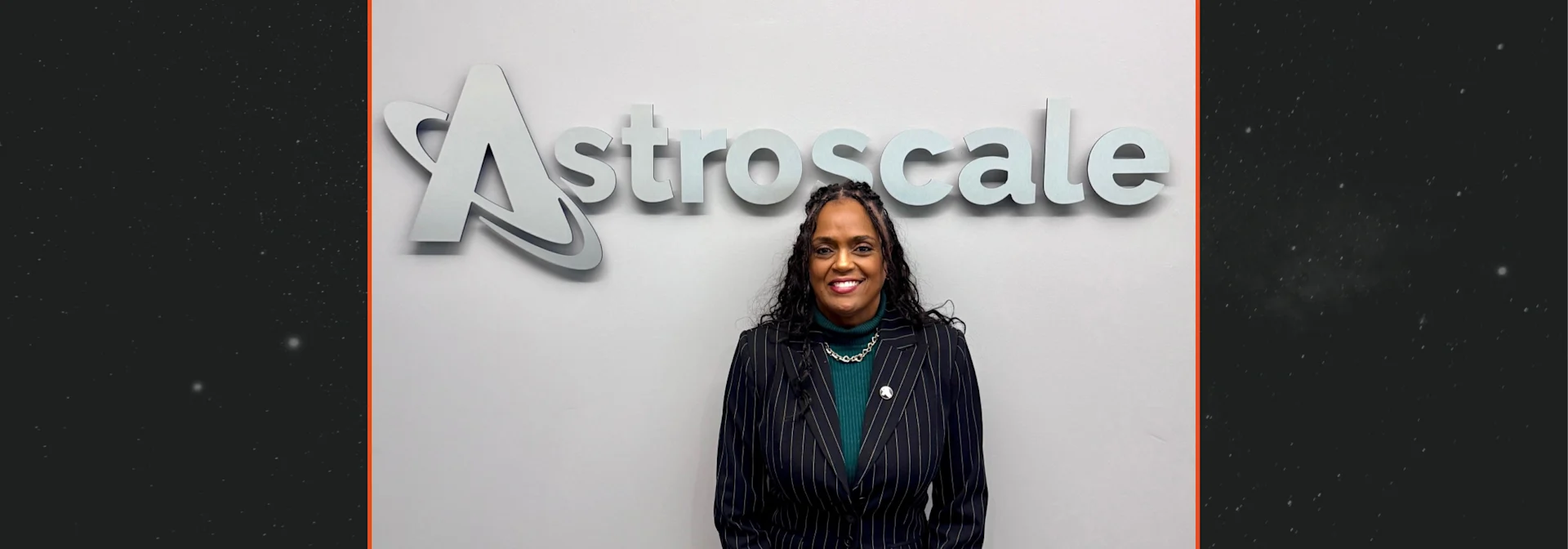Many minority students and young professionals see the space industry as being out of reach, and the prevailing misconception is that the only way in is with a background in aerospace engineering. This couldn’t be further from the truth. With last month being National Native American Heritage Month, it’s a great time to reflect on the importance of diversity in STEM fields — and to highlight the many paths available to build a meaningful career in aerospace.
But first, let me introduce myself. I’m Mark Muktoyuk, but I often go by “Muk” for short. As Astroscale U.S.’s Senior Guidance, Navigation, and Control Systems Engineer, I recently had the privilege of moderating the panel “Careers in Aerospace: A Surprisingly Wide View of What’s Out There” at this year’s National Diversity in STEM (NDiSTEM) conference. It’s the largest multidisciplinary and multicultural STEM diversity conference in the U.S., and the conference is hosted by The Society for Advancement of Chicanos and Native Americans in Science (SACNAS). To a room filled with over 150 undergraduate and graduate students, the panelists shared their personal journeys into the industry, discussed the wide variety of available roles, and stressed the value of diverse skillsets in aerospace.
NDiSTEM panelists
I’m on the left, next to Nick Gross, Cherilynn Morrow, and Aaron Vigil.
Keep reading to gain the panelists’ insights, so you can take the first step towards your own career in aerospace.
It’s Not All Rocket Science
“Do I have a place in the space industry if I don’t major in aerospace engineering?” This was the question that sparked the panel discussion at NDiSTEM.
Not only are there numerous technical degrees needed in aerospace — electrical engineering, mechanical engineering, math, physics, computer science, etc. – but business-related skillsets are vital for the industry’s success, too. Careers in marketing, communications, facilities management, and entrepreneurship all contribute to the aerospace ecosystem.
And it doesn’t stop there. Policy experts, lawyers, and international relations specialists play a key role in ensuring regulatory compliance and fostering global collaboration. There’s a lot that goes into flying in space, and it takes all kinds of skills to make it all work.
Career Opportunities in a Nutshell
Careers in Aerospace Blog Post Dec 2024
Within business, engineering, and everything in between, there’s a plethora of careers available in the aerospace industry!
As mentioned above, diverse skillsets make up the aerospace industry. They include:
Engineering
Aerospace (Keep in mind, very few Aerospace professionals actually have an aerospace engineering degree!)
Electrical
Mechanical
Computer
Sciences
Applied mathematics
Physics
Astrophysics/Heliophysics
Chemistry
Business and policy
Entrepreneurship
Law
Marketing and communications
Political science and international relations
International science and technology policy
Creative and Interdisciplinary
History
Graphic design
Arts and English
Note: This isn’t an exhaustive list. There’s a breadth of knowledge required for a thriving space industry!
“After attending the SACNAS/NDiSTEM panel titled “Careers in Aerospace: A Surprisingly Wide View of What’s Out There” hosted by Mr. Mark Muktoyuk and his colleagues, I have a blossoming determination in applying my versatile background towards answering questions of the unknown, present in the cosmos. Through my experiences in different disciplines, including but not limited to biology, anthropology and neuroscience, I am eager to expand my horizons to encompass space sustainability as we know it.”
– Nneka Otuonye, Undergraduate in Biology and Anthropology at Georgia State University
Becoming a Pioneer: The First Challenge
Being the only one in your circle interested in aerospace can feel like the first hurdle to entering the space. Maybe you’re from a town with little-to-no tech industry, or you simply don’t have role models in the space to guide you towards opportunities. No matter the cause, being “the first” can make it feel like you’re not prepared to pursue your passion – but that’s not the case! Each of the panelists were the first from their indigenous communities to work in the industry, and each has encountered plenty of “first generation” aerospace professionals. It’s not only possible, it’s happening all the time!
Aerospace =/= Perfect Grades
One big myth about the aerospace industry is that only straight-A students can succeed. While academic performance is important, what truly sets candidates apart is their enthusiasm, work ethic, and ability to juggle competing priorities.
More and more employers are recognizing that new-grad applicants are more than just their grades. Extracurriculars like science and engineering clubs, internships, or personal projects can often speak volumes – more than a transcript ever could. And remember: overcoming challenges, like retaking a class, shows persistence and grit.
“After listening to the panel on careers in aerospace, my eyes were opened to so many possibilities. I felt motivated to continue pursuing a career in such an important field even as a community college student. Knowing that I’m not limited to pursue aerospace by my grades, degree, school, gender, and overall background was so reassuring.”
– Vanessa Ponce, Undergraduate in Aerospace at Red Rocks Community College studying Aerospace (and an aspiring astronaut!)
You Can Pivot and Still Find Your Way
Your career path doesn’t have to be linear. Each of the session panelists realized a career in aerospace was a possibility surprisingly late: either near the end of undergraduate career, or even only after entering the workforce. You’re never “locked in” to a profession because of your major, completed internships, or even first job. Follow your current interests now, and know that you can always pivot later. The aerospace industry will be here!
“The message that we are not restricted to the decisions we make resonated deeply with me. It encouraged me to view each choice as a flexible step, allowing room for growth and finding my passions. I believe that following what truly excites me will allow me to become the best version of myself, fully engaged and driven in my endeavors.”
– Matthew Madrid, Undergraduate in Aerospace Engineering at UC Irvine
How to Enter the Aerospace Industry
The panelists laid out three effective ways to find your footing in the aerospace industry:
Use your academic resources. Gather career information from your academic advisors or career services departments. It’s also great to speak to your professors who might have ties to the industry.
Make your interest known. Academic advisors and professors are great to discuss your career goals with, but they aren’t the only ones that can help. Express your interest to relatives, friends of family, older students, and professional acquaintances. You never know whose aunt or cousin might work at NASA!
Stay tuned in to the industry. Staying informed helps you discover opportunities as they arise. Look into joining student organization like SGAC or SEDS, listen to podcasts (t-minus Space Daily, the SSPI Podcast, or Pathfinder), or watch free webinars (like SHIELD Science Path webinars, for example).
Helpful Resources
Ready to take the first step towards a career in aerospace? Here are a few resources to get you started:
Space Generation Advisory Council (SGAC)
Students for the Exploration and Development of Space (SEDS)
Space and Satellite Professionals International (SSPI)
SSPI’s Women in Space Engagement
Society of Professional Hispanic Engineers
American Indian Science & Engineering Society
National Society of Black Physicists
National Society of Black Engineers
NASA Space Grant
Help Spread the Word!
At the end of the panel, I encouraged attendees to be leaders in their local communities and spread the word to others who might be interested in the industry but unsure of how to proceed. Speaking directly to our Native and Chicano/Hispanic communities to provide encouragement is key, as these communities remain underrepresented in technology in general, and in aerospace in particular. Showing the next generation there are places for us in the industry is one of the most rewarding things about conferences like NDiSTEM.
The aerospace industry is vast, exciting, and full of opportunities for individuals from every background. Whether you’re just starting out or considering a career pivot, remember—there’s space for you here.
Want to hear more about the various pathways into the industry? Read our recent interview with 2024 SGAC Alumni Award Winner and Astroscale U.S. Senior Director of Engineering Jeff Schloemer to learn how he joined the industry, advice he’d give to those interested in the space, and more.
All Categories
Recent Posts




